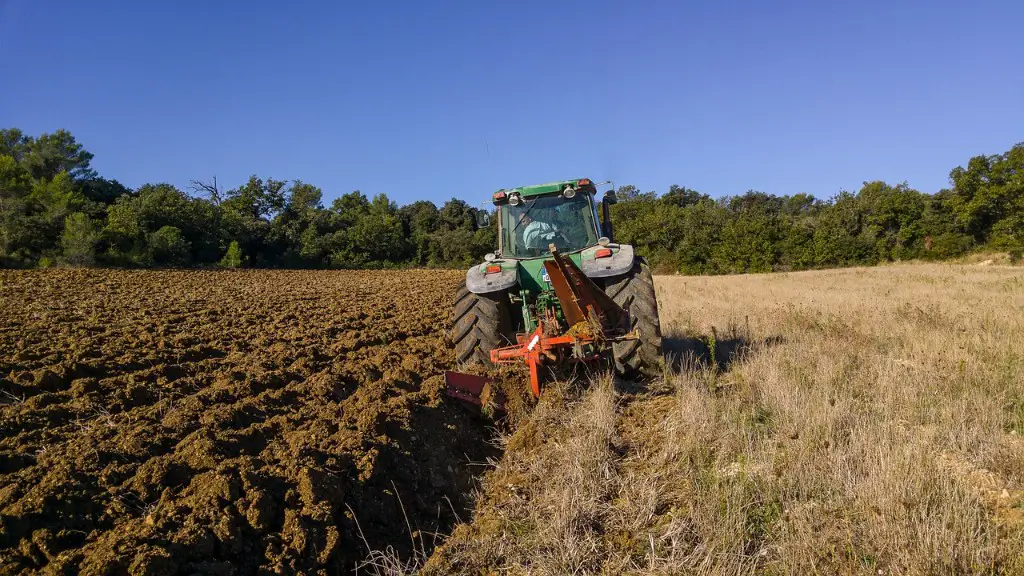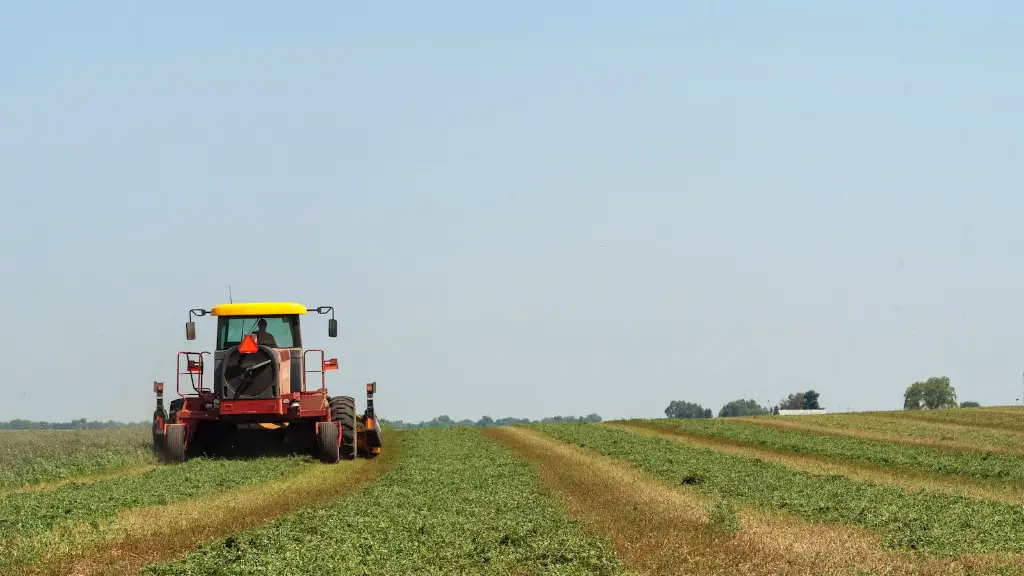Organic agriculture is a type of farming that focuses on using natural processes, rather than artificial chemicals, to grow crops and raise animals. This approach can have numerous benefits for the environment, including reducing pollution, promoting soil health, and conserving water.
Organic agriculture reduces pollution and conserves water and energy resources. It also promotes healthy soils, which provide food for the organisms that live in them and help plants to grow.
How much does organic agriculture benefit the environment?
Organic practices help keep our water supply clean by prohibiting the use of toxic and persistent chemicals. Moreover, organic agriculture helps to reduce our carbon footprint and combat climate change by absorbing carbon dioxide from the air.
Organic farming is a method of producing food without the use of chemical pesticides. This type of farming has many benefits, including higher yields in times of drought, less energy use, and fewer carbon emissions.
What are 5 pros of organic farming
Organic farming is beneficial for the environment as it does not use harmful chemicals and pesticides. It also promotes sustainable development as it does not deplete the soil of its nutrients. Organic food is also healthy and tastes better than conventionally grown food. Organic farming is also an inexpensive process, as it uses organic inputs that are readily available. Moreover, it generates income through exports as organic food is in high demand. Finally, organic farming is a source of employment for many people.
Organic farming has many benefits compared to conventional agriculture. These benefits include using fewer pesticides, reducing soil erosion, decreasing nitrate leaching into groundwater and surface water, and recycling animal wastes back into the farm. However, these benefits are counterbalanced by higher food costs for consumers and generally lower yields.
Is organic farming more environmentally friendly?
Organic farms tend to have more fertile soil, use less energy, and sequester more carbon. Research has shown that organic farms use 45 percent less energy, release 40 percent less carbon emissions, and foster 30 percent more biodiversity compared to conventional farming. These numbers demonstrate the clear environmental advantages of organic farming. Additionally, organic farms tend to use less water and fewer chemicals, furthering their sustainability.
Organic agriculture can help reduce our reliance on non-renewable energy sources, like fossil fuels, by decreasing the need for agrochemicals. Organic agriculture can also help mitigate the greenhouse effect and global warming by sequestering carbon in the soil. By using organic methods, we can help reduce our impact on the environment and make our agricultural practices more sustainable.
Is organic farming better for the environment than conventional farming?
Organic farming is a much better option than conventional agriculture when it comes to greenhouse gas emissions, soil erosion, water pollution, and human health. Organic farming has a smaller carbon footprint, conserves and builds soil health, replenishes natural ecosystems for cleaner water and air, all without toxic pesticide residues.
Organic agriculture can help with climate change adaptation and resilience in a few ways. Because organic agriculture systems generally have lower yields than conventional agriculture systems, they are more resilient to extreme weather events like droughts or floods. They are also less dependent on fossil fuels and heavy machinery, which can be disrupted by extreme weather. Finally, organic agriculture systems often promote and encourage biodiversity, which can help ecosystems better adapt to a changing climate.
What are 4 advantages of organic sustainable agriculture
Sustainable agriculture has many advantages that make it a desirable option for farmers and consumers alike. Cost reduction is a major advantage, as it is often cheaper to implement sustainable practices than traditional farming methods. Additionally, sustainable agriculture can help to control air and water pollution, as well as soil erosion. Biodiversity is another advantage, as sustainable agriculture methods can help to preserve natural habitats and encourage wildlife populations. Finally, sustainable agriculture can promote social equality, as it can help to provide economic opportunities for small-scale farmers and marginalized communities.
Organic farming is a type of agriculture that relies on natural processes, rather than the use of synthetic inputs, such as pesticides and fertilizers.
There are several advantages to organic farming. Firstly, organic farmers do not use chemicals to control pests and diseases. This means that there is less resistance to these pests and diseases, and that they can be controlled more naturally. Secondly, organic farming supports healthier soil and pollinators. This is because organic farmers use organic matter, such as compost, to improve the quality of the soil, and because they often plant pollen and nectar-rich plants to attract pollinators. Finally, organic farming does not use genetically-modified food items. This means that the food items produced are closer to their natural state and are less likely to be harmful to consumers.
However, there are also some disadvantages to organic farming. Firstly, organic food items can be more expensive than their non-organic counterparts. This is because organic farmers often have smaller farms, and because they do not receive government subsidies. Secondly, organic farming can have a higher production cost. This is because organic farmers often have to put in more labor, and because they often use more expensive inputs, such as organic seeds.
How is organic farming better for humans?
There are many advantages to organic food production, but one of the main advantages is the restricted use of synthetic pesticides. This leads to low residue levels in foods and thus lower pesticide exposure for consumers. It also reduces the occupational exposure of farm workers to pesticides and drift exposures of rural populations.
It is important to maintain environment health by reducing the level of pollution. It helps to reduce human and animal health hazards by reducing the level of residues in the product. It also helps to keep agricultural production at a sustainable level and reduces the cost of agricultural production.
Does organic farming reduce climate change
Organic agriculture can help to keep our planet healthy and reduce greenhouse gas emissions. farming is more resilient to climate change. The improved water holding capacity of organic soils makes it easier to deal with wet and dry intervals.
Organic farming is widely considered to be a more sustainable alternative when it comes to food production. The lack of pesticides and wider variety of plants enhances biodiversity and results in better soil quality and reduced pollution from fertilizer or pesticide run-off.
How does organic farming fight against global warming?
Organic agriculture techniques can contribute significantly to sequestration of CO2 in the soil. These techniques include cover cropping, crop rotation, composting, and no-tillage. All of these practices help to improve soil health, which in turn helps to sequester more CO2 in the soil. healthier soils.
Organic farming has many advantages over traditional farming practices. It is more climate-friendly and less harmful to the environment. It is also more sustainable and has a smaller carbon footprint. However, there are also some disadvantages to organic farming. Pesticides and other toxic materials may still be present in organic food, and it can be more expensive than traditional food.
Conclusion
Organic agriculture is beneficial to the environment in a number of ways. First, organic farmers do not use synthetic pesticides or fertilizers, which can leach into the soil and water and cause pollution. Second, organic agriculture promotes biodiversity, which helps to maintain a healthy ecosystem. Third, organic farmers often use sustainable practices, such as cover crops and crop rotation, which help to conserve resources and protect the environment.
Organic agriculture has many benefits for the environment. It promotes biodiversity, helps to improve and maintain soil health, and reduces the use of synthetic chemicals and fertilizers.





